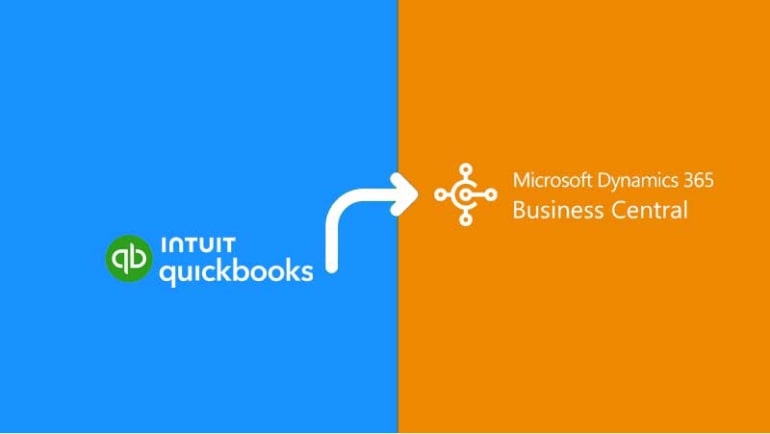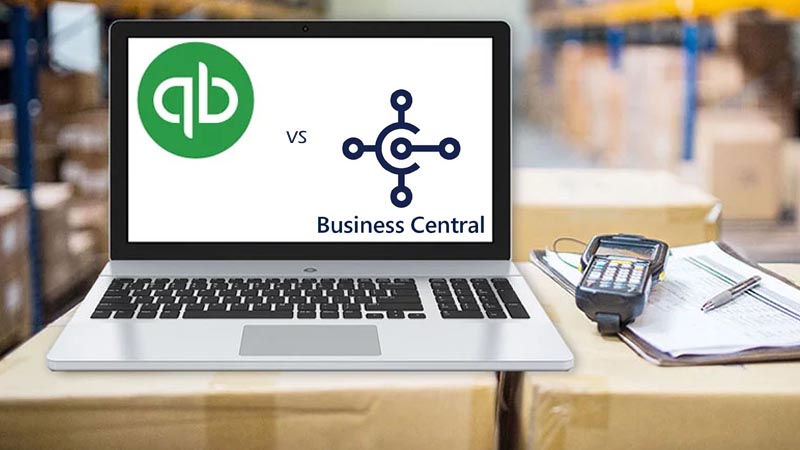QuickBooks to Dynamics 365 Business Central Migration
Both Microsoft Dynamics 365 Business Central and QuickBooks are accounting-capable software solutions for businesses. Each one provides the core features and functionality required to manage the accounting needs of a small business. However, there are substantial differences between the two solutions beyond this point.
Although QuickBooks is a popular accounting software, many small businesses discover the hard way that it is not ideal for firms that are growing. It is restrictive and rigid for dynamic businesses, and adding more licenses and computing power to increase its usage is too expensive. Due to its usability and capacity to satisfy the complicated needs of growing small and medium-sized organizations, many firms have shifted to scalable and affordable alternatives, such as Microsoft Dynamics 365 Business Central.
QuickBooks’s constraints
QuickBooks has constraints on the number of records it can process, the number of records it can archive, the number of employees it can hire, the number of transactions it can post, etc. When these constraints are met, your only choice is to begin clearing QuickBooks’s history.
Due to an insecure file format, QuickBooks data tables are susceptible to direct alteration. This allows uploaded transactions to be “modified” after the fact without leaving a trace of the changes made. Even transactions that are out of balance in your data can be created. (Credits do not equal Debits). Lack of purchasing, inventory, distribution, auditing, and advanced reporting capabilities. It is costly to add features and services from QuickBooks’s partners. Due to a lack of connectivity with business productivity, the system favors accountants above business owners.
The discourse between Dynamics 365 Business Central and QuickBooks rages on, but QuickBooks’ user and transaction limits, as well as its restricted reporting features, make it vulnerable to becoming a bottleneck for businesses.
Top reasons for QuickBooks to Microsoft Dynamics Business Central Migration
1. Compliance with GAAP and Audit Controls
Compliance and audit controls are essential to preventing fraud and loss for your business. QuickBooks does not comply with GAAP, however D365 Business Central does.
With QuickBooks’s inadequate restrictions, it is straightforward to change posted transactions, including those that have already been reconciled. D365 Business Central is fully auditable due to the continual background monitoring of records.
Business Central is the ideal option if you want to prevent fraud and know the why, what, where, when, and who of all financial transactions. With Dynamics 365 Business Central on the Microsoft Cloud, you have access to a variety of cutting-edge security innovations, such as this one.
2. Advanced Reporting
Reports are the lifeblood of business owners and financial specialists, and dimensions really shine in this context. Using Dynamics 365 Business Central, you may generate ad hoc reports based on the dimensions and manner in which you wish to view your data – by profit center, department, sales, inventory, or purchasing – the possibilities are virtually limitless.
In addition, you can leverage Business Central’s native integration with Power BI to gain a broader perspective and integrate external data into aggregated, visual, interactive reports. In contrast to QuickBooks, no data is hidden in Business Central, thus the world is your oyster.
3. Integrate Numerous Entities and Currencies
If you have more than one or two businesses or currencies, it goes without saying that selecting Business Central over QuickBooks will save you a tonne of time and effort. With simple intercompany transactions, Business Central allows you to create an unlimited number of businesses or other entities.
For the purpose of managing all finances in USD and filing reports individually or collectively, it is also possible to incorporate a single business that merges multiple firms into a single currency. It is pretty outstanding and a standard capability of Business Central.
4. Scalability
There are limitations on the number of records QuickBooks can process and store. There are restrictions on the number of employees, posted transactions, inventory management data, and other variables. Once you’ve crossed these thresholds, the only way to maintain the system’s functionality is to delete data from QuickBooks; the system also begins to run more slowly.
Dynamics 365 Business Central is devoid of such limitations. As your business grows, it actually gives a great deal more flexibility. It is developed on the Microsoft Azure platform and is scalable to suit the increasing number of users and transactions.
5. Highly Effective Integration Capabilities
Microsoft AppSource is a collection of numerous apps that work with Microsoft Business Central. If you need to develop a custom solution for your business, you can search AppSource for a suitable application and integrate it with Business Central.
In addition, if you work in business or are an accountant, you will require Excel to manipulate numbers. Business Central is compatible with Microsoft Office, Microsoft Outlook, and other Microsoft applications. It removes the need to migrate between platforms and saves a significant amount of time training personnel on each one. Additionally, employing a solution that employees are familiar with and have been utilizing for an extended period of time boosts employee productivity.
6. A Comprehensive Financial Management Solution
Accounting software is only one of Business Central’s features. It is an integrated financial management system. It allows you to track and store information regarding, among other things, client information, warehouse management, logistics, costing, and administration of the employee’s. It provides a comprehensive view of your business by connecting data from accounting, sales, purchasing, and inventory, among other areas.
In contrast, the accounting software QuickBooks has limited applications across business departments. Therefore, it makes sense for QuickBooks to Microsoft Dynamics Business Central Migration if you wish to install a comprehensive, enterprise-wide solution.
Taking a Step forward
Transitioning from outgrown accounting software to a modern, feature-rich ERP system can be challenging. As you likely know, Microsoft Dynamics 365 Business Central provides businesses with substantially more resources and capabilities than QuickBooks, but it may be difficult to get started.
So if you are contemplating the pros and cons of Dynamics 365 Business Central vs QuickBooks get in touch with us immediately, and we will help you make a successful for QuickBooks to Microsoft Dynamics 365 Business Central Migration.




